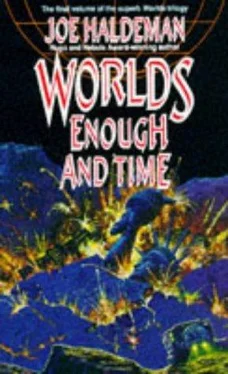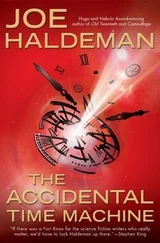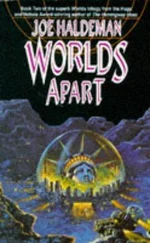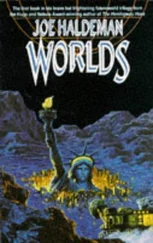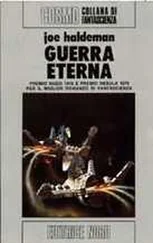No one in the party recalls anyone making a sound, but the animal sensed them somehow, perhaps by smell, and its reaction was swift. The tentacles let go of their moorings and sprayed water in twelve directions as the gasbag snapped shut. The creature rose fast, like something falling into the sky. People fired at it, but it was a difficult target, bobbing in crosscurrents, and in a few seconds it was just an iridescent dot sailing away. Dozens of other small bubble creatures flew away in reaction.
The exploration party people spread out around the perimeter of the swamp and surveyed it. It was a circle about twenty meters in diameter, with steep banks, like a crater or sinkhole. One person volunteered to wade out, but quickly sank up to his knees in muck; it took several people, pulling on a rope tied under his arms, to extract him.
Throwing the rope out with a light weight attached, sounding, showed that the pond was nowhere more than a couple of meters deep. It had probably filled up with decaying vegetable matter. (One of the team, a biologist, noted that unless this was a transient condition, there had to be Something Down There keeping the level constant. The leader asked with a straight face whether anyone would care to swim across and see if anything happened.)
One of the helium outlets was close enough to the shore for them to fill a sample jar without wading. They collected four samples of small gasbag organisms and counted thirty-nine others scattered across the surface. All but three of them had green tendrils inside, though it would have been premature to therefore call them plants. There are unicellular Earth animals like the euglena that can photosynthesize.
They agreed that this was enough of a find for one day, and filled all their sample containers with water, air, mud, and vegetation from various sites. Then they scientifically threw rocks into the water to see whether anything would happen. Nothing did.
Dear Mair,
You’re always after me about how important it is to practice my writing, so here’s a letter. Don’t faint. It’s almost impossible to get on the ’Home line anyhow, with all the floating spider goatshit. Figure I can write this out and just put it on queue, and when somebody pauses a nanosecond to take a breath, zip! We’ve made contact.
It is scary. You know Jakob was on guard on the other side of the camp when Kisti got attacked by that thing. It gives me the cold sweats to think it might have been him, and he might not have gotten a knife out. Kisti says it was plain dumb luck that she survived, that her hand was near her knife. She’s kind of fixated on it; just a second before, she was picking her nose. What a way to die, she says, strangled to death with your finger up your nose.
Well, we got enough roofs up for everybody to sleep under, or try to sleep anyhow. Camp full of hollow-eyed zombies this morning. So I got my trusty idiot stick and went out to the trench detail. (That’s from America or England, the term for a shovel: a stick with dirt on one end and an idiot on the other.) We need a meter-deep trench laid from Hilltop to the water plant.
It’s not exactly challenging but it does keep the kilograms off, and the company was interesting. Tranj Boyle, who was doing astrophysics before he became a fellow common laborer, tried to explain to me about the helium. It’s the second most abundant element in the universe, I guess you knew that, but it gets baked out of rocks like Epsilon and Earth a long time before they cool down, and they don’t have enough gravity to hold on to it long anyhow. Earth has something like two or four times as much helium as it should have, depending on who you ask, and Epsilon has something like two thousand times as much. In the case of Earth they could just tug on their beards and say hum, something’s a little off here, but now with Epsilon they have to admit there’s something basically wrong with their notions of what goes on when a planet forms.
Because there’s no chemical way to make new helium, I guess you know. Some from radioactivity but we aren’t exactly glowing in the dark. It looks like all the stuff that’s bubbling up out in those ponds has been here all ten billion years. And it’s inside the crust instead of in the atmosphere. Driving them nuts!
Well, this science stuff bores you shitless, I know, but I think it’s kind of fun. Thinking about doing a geology degree once we’re settled in here. I’m certainly one of the world’s authorities on dirt! Seriously, geology’s one of the physical sciences they’ve got pretty well reconstructed, at least to the bach-degree level. They’ll need geologists for exploring the planet, and maybe its moon. Don’t want to be tied to a desk. I want to be out there battling weird creatures and worrying Mother sick. Just kidding.
Thine own Sandra.
Age 56.16 [8 Ten 429]—This is three days’ worth. Been busy.
Saying good-bye to John wasn’t so bad, since I’ll be traveling back and forth between the planet and ’Home for some time as General Liaison. I could have set up the job description myself: someone born in New New who had been to Earth, who had professional connections with both Engineering and Policy tracks; preferably someone who had emotional ties to people both in ’Home and on Epsilon.
The shuttle descent was smoother than the three I experienced on Earth, but the landing made me nervous, remembering the Leaning Tower of Shuttle that Sandra and her crew had scurried out of. Of course the deceleration was computer-controlled and we settled to the surface as gently as a feather. I held my breath for a moment, and the thing didn’t topple over.
We unbuckled immediately and went to the exit lift, which surprised me. I thought we’d have to wait until the ground cooled some. In fact, that was the reason for the slight sideways shift I thought I’d felt just before the engine cut off. The pilot decelerated over a “hot spot” and at the last minute slid about a hundred meters over to the landing area proper, so the ground would be cool enough for us to jump out. Just in case.
Repeated landings had baked this area hard as brick. That was the first smell: scorched earth, as they used to say in a different context. Then a breeze brought cool forest smells; maybe a hint of the lake. Not earthlike, but definitely not the greenhouse smell of ’Home and New New. Alien but pleasant.
The settlement was almost a kilometer away, on top of a low rise. Three ribbons of smoke angled away, I guessed from the adobe furnaces. I could hear a faint chirping and squeaking from the forest creatures, scolding us for waking them up.
There were ten people waiting on an elevated metal platform. I hadn’t expected Sandra, since she was assigned to a building detail down at lakeside, but she was among the ten. She ran over and gave me a hug, and then pulled me along to meet Raleigh Dennison, the camp’s Coordinator pro tern.
We’d met several times in ’Home, of course, but he was literally a different man here. About my physical age—born a few years after Sandra—he had seemed pale and aristocratic, delicate, up there. A couple of months’ pioneering had turned him tan and muscular, and he sported a piratical moustache, curled at the ends. I had to laugh at the transformation.
He laughed along with me. “It’s the alien gravity,” he said. “Two months here and you’ll look like a farm girl yourself.” I doubted that anything would make me look like a “girl,” short of a time machine, but did look forward to working outdoors for the first time this century.
This flight had brought fifteen people and two tonnes of supplies. We loaded as much as we could on the utility floater and stacked the rest on the loading platform. The load for the return trip was light, a few boxes and cages of samples and animals, and two people who needed medical treatment. Hilltop’s first-aid station wasn’t up to cancer or schizophrenia.
Читать дальше
